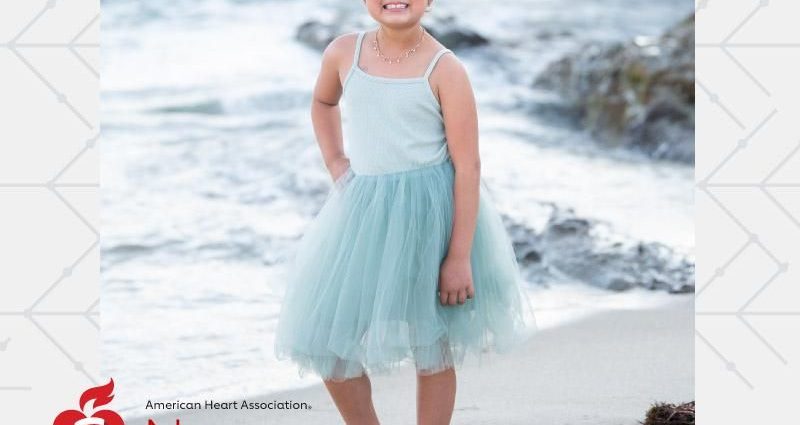THURSDAY, Jan. 13, 2022 (American Heart Association News) — “Mommy, I’m tired” became a common refrain from usually peppy 7-year-old Olivia Story to her mother, Jennifer.
Olivia also wasn’t eating as much as usual. And she often had a low-grade fever.
The family was about to head from their home in Chino Hills, California, to a lake house in Arizona. So Jennifer texted the pediatrician, “Something is off with Olivia.”
This was July 2020. Because of the COVID-19 crisis, the doctor cautioned Jennifer to wait and see if Olivia’s fever increased.
Olivia rallied during the trip. A week later, she woke up with a blood blister on her top lip.
Jennifer was alarmed. She took Olivia to the emergency room. Doctors found the girl had a slightly enlarged spleen, but weren’t too concerned.
“Can you just run some blood tests for my peace of mind?” Jennifer asked him.
The doctor agreed.
Thirty minutes later, he returned with a panicked expression.
“Mrs. Story, I need to talk to you,” he said, taking Jennifer out of the room. “Olivia’s white blood cell count is through the roof. I can’t confirm what it is, but it may be leukemia.”
Two days later, oncologists told Jennifer and her husband, Jason, that Olivia had leukemia. She needed to start chemotherapy right away.
When Olivia was told she was sick and would need treatment, she screamed, “Mommy, what is leukemia? Am I going to die?”
Jennifer prided herself on being confident. But in this moment, she didn’t know what to say.
A biopsy showed Olivia had B-cell acute lymphoblastic leukemia. Treatment is grueling – but it has a high survival rate.
“We stayed positive as a family, but we were all scared,” Jennifer said. “Her twin sister took it the hardest. Those girls were joined at the hip.”
Olivia endured several rounds of chemotherapy. A local nonprofit that helps families with children facing medical treatment provided meals, holiday gifts and more.
With family, friends and science on her side, Olivia returned to her usual strong, optimistic self.
From August 2020 to February 2021, she did not miss a day of school. (It helped that classes were held virtually.) On the days she had chemo, she took her laptop to the clinic.
Every Monday was “Superhero Day” – the superhero being Olivia. Fellow students celebrated by wearing superhero T-shirts.
One morning in February 2021, during her third round of chemotherapy, Olivia said, “Mommy, I feel weird. I can’t feel my right hand.”
Jennifer detected a slight lisp. The symptoms reminded her of relatives who’d had strokes. She took her concern to the doctor, who sent Olivia to the emergency room.
While being examined by a teleneurologist, Olivia began to convulse. She was having a stroke.
Doctors said it was from cerebral venous sinus thrombosis. That means a blood clot formed in her brain’s venous sinuses, preventing blood from properly draining out of the brain.
Olivia was transferred to a hospital in Los Angeles. She underwent surgery to remove the clot.
Had Olivia come to the emergency department with the same condition 10 years ago, “she may have had permanent cognitive and physical disability,” said one of the doctors who treated her, Dr. Navdeep Sangha.
Olivia spent less than two days in intensive care, amazing her doctors with how quickly she started walking, talking and eating.
“While the medical care is similar as it was 10 years ago, the advancement in the recognition of stroke as a possibility in children, as well as the quick activation of the emergent pediatric stroke system of care, is what made a difference,” Sangha said.
Olivia has fully healed from the stroke. Her chemotherapy is scheduled to continue until November.
Olivia is back in school, where masks are mandatory. Plastic shields protect her and her twin sister, and the children practice social distancing during lunchtime.
“We still walk on eggshells, but not as much anymore,” Jennifer said. “Olivia remains calm, positive and determined. Her attitude plays a huge part in her healing. At one point she even said that school was harder than chemo. I’m glad she doesn’t see what we see as adults.”
American Heart Association News covers heart and brain health. Not all views expressed in this story reflect the official position of the American Heart Association. Copyright is owned or held by the American Heart Association, Inc., and all rights are reserved. If you have questions or comments about this story, please email editor@heart.org.
By Diane Daniel
Copyright © 2026 HealthDay. All rights reserved.

